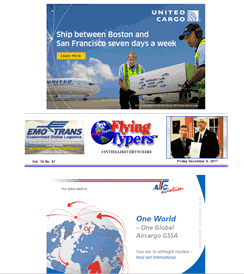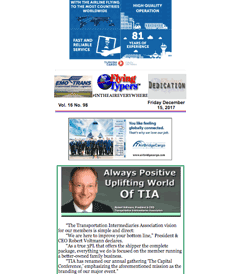

#INTHEAIREVERYWHERE
 |
 #INTHEAIREVERYWHERE |
| Vol. 16 No. 100 | Friday December 29, 2017 |
SLOTS Some Are Set Maughan |
The lack of winter season slots at AMS forced many cargo airlines to find alternative airports and highlighted the glaring lack of global airport capacity. In the first part of this special FlyingTypers series, the European Shippers’ Council called for reform of IATA’s 80:20 slot guidelines. In part two, FlyingTypers speaks to Lara Maughan, Head of Worldwide Airport Slots. Making The Case All-cargo airlines have the opportunity to press their case for more leeway when it comes to slot allocations but making changes to ‘80:20’ guidelines will be difficult, according to IATA. The 80/20 Rule IATA’s ‘use
it or lose’ 80:20 formulation is part of the Worldwide Slot Guidelines
(WSG) used to allocate capacity at leading airports globally. These state
that if an airline uses at least 80 percent of its allocated slots it
assumes historic rights to the slots for the next season. How About 70/30? As
previously reported, a global shortage of slot capacity has hit the
headlines recently, primarily due to the loss of slots experienced by
freighter operators at AMS, which has seen multiple services diverted
to secondary European airports. Maughan & Change: Long & Winding Road But according to Lara
Maughan, Head of Worldwide Airport Slots IATA, making changes to WSG is
a long and difficult process. WSG, she said, was the foundation upon which
the global slot allocation process was built and it was designed to benefit
airlines, airports, and passengers by optimizing the use of scarce airport
capacity. Insuring Access View S/H Maughan insisted the guidelines
ensured slots at capacity-constrained airports around the world were allocated
to airlines using consistent policies, principles, and processes and were
reviewed on a regular basis to keep up with regulatory changes. No 10 Percent Solution While reluctant to comment
on whether leisure airlines will squeeze cargo operators out of major
hubs such as AMS in the future, as shippers allege, she said IATA’s
analysis of a move to a 70:30 split on historic slot allocation had shown
this would not yield the extra leeway cargo airlines sought. One For All “It’s very
difficult to meet demand at the moment due to a lack of capacity and I
think as an industry we focus our attention on creating more capacity
for all.” Other Voices However, while FlyingTypers learned that at least two integrators including DHL are participating
in the current review, neither Maughan or IATA’s communications
department were able to provide any information about how other cargo
airlines or freight supply stakeholders could participate, or when the
current review would be concluded. Brexit Speculation Weighs In Asked how Britain’s
decision to leave the EU might affect its implementation of WSG, Maughan
replied: |
If
You Missed Any Of The Previous 3 Issues Of FlyingTypers Access complete issue by clicking on issue icon or Access specific articles by clicking on article title |
||
 Vol. 16 No. 97 Blockbuster CNS PayCargo Chuckles For December 8, 2017 Cargo C'est Magnifique Delhi To Go January Summit Lest We Forget Super Moon |
 Vol. 16 No. 98 Always Positive Uplifting World of TIA Chuckles for December 15, 2017 Delta Expanding CEIV Remembering Richard |
|
Publisher-Geoffrey
Arend • Managing Editor-Flossie Arend • Film Editor-Ralph Arend • Special Assignments-Sabiha Arend, Emily Arend • Advertising Sales-Judy Miller |
|